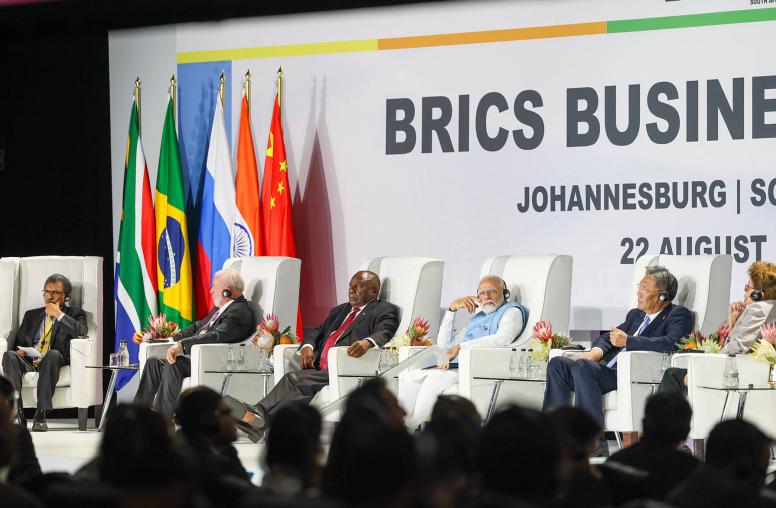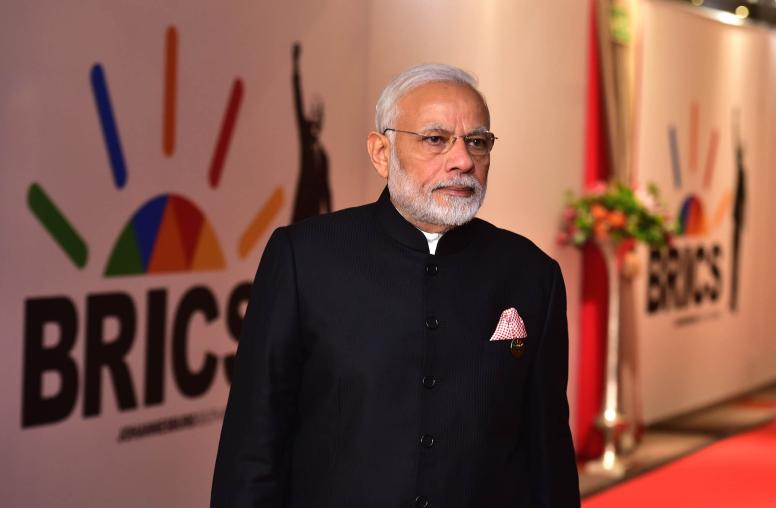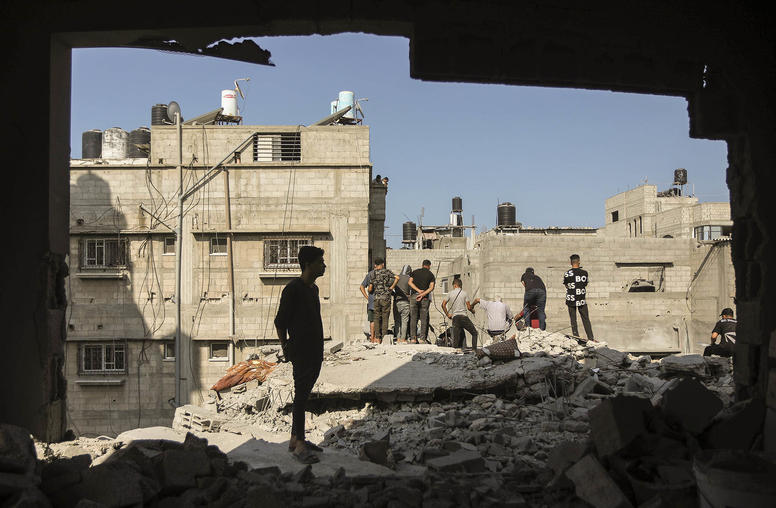Israel-Hamas War Divides Latin America Along Partisan Lines
Leftists have been fiercely critical of Israel, but their positions are guided as much by personality, history and domestic politics as by ideology.
As casualties mount in the Israel-Hamas conflict, many Latin American leaders are intensifying their criticism of the Israeli government. Bolivia recently became the first country to sever ties with Israel; Chile, Colombia and Honduras recalled their ambassadors for consultations; and diplomats from Argentina, Brazil and Mexico have blasted Israel for the bloodshed, calling for an immediate end to hostilities.

While Israel’s fiercest critics in the region are leftists, their positions regarding the conflict are guided as much by personality, history and internal politics as by ideology. And despite differences with the United States over conflict in the Middle East, most of these democratically elected leftist leaders are also pragmatists whose bilateral relations with Washington tend to reflect their countries’ economic self-interest.
President Joe Biden hosted officials from 11 Latin American countries on November 3 for an economic summit that focused on two U.S. priorities: containing migrant flows by bolstering regional economies and strengthening supply chains to reduce reliance on Chinese trade and investment. Attendees included critics of the Israeli offensive in Gaza, including the presidents of Chile and Colombia and the foreign minister of Mexico.
USIP’s Mary Speck looks at how national interests shape Latin American responses to the conflict. Nicolás Devia-Valbuena and Lucila Del Aguila examine the domestic and international factors driving responses to the Israel-Hamas war in Brazil and Mexico. And Sebastián Guerra discusses controversies over the Colombian president’s use of social media to condemn the Israeli offensive.
All Geopolitics Are Local in Latin America
Speck: At first glance, Latin American reactions to the Israel-Hamas war seem to follow predictably partisan lines. On the right, a handful of countries with conservative governments — including Guatemala, Ecuador, Paraguay, Costa Rica and Peru — immediately expressed strong support for Israel.
Salvadoran President Nayib Bukele, whose paternal grandparents were Palestinian, identified Israel’s battle against Hamas with his government’s offensive against street gangs. “The best thing that could happen to the Palestinian people is for Hamas to completely disappear,” he posted on social media. “Anyone who supports the Palestinian cause would make a great mistake siding with those criminals,” adding that it would be like Salvadorans siding with “MS13 terrorists.”
But on the left — which includes the majority of the region’s current presidents — criticism of Israel’s bombardment of Gaza is growing.
Latin America’s left ranges from stridently anti-U.S. dictatorships of Cuba, Nicaragua and Venezuela to leaders of vibrant democracies in Argentina and Chile. The latter’s reasons for opposing Israel’s offensive in Gaza vary. Chilean President Gabriel Boric has put human rights at the center of his government’s foreign policy and, unlike some other leftist leaders, has condemned human rights abuse in Nicaragua and Venezuela. Before recalling the Chilean ambassador from Israel, Boric had denounced the Hamas attack on Israel without reservation. His government’s hardening stance on the war in Gaza may reflect the fact that nearly half-a-million Palestinian migrants make their home in Chile, the largest Palestinian diaspora outside the Arab world.
In neighboring Argentina, Peronist President Alberto Fernandez has also condemned the Israeli military response but his government has refrained from disrupting diplomatic ties. Nonetheless, a foreign ministry statement about the conflict generated immediate pushback both from the ruling coalition’s presidential candidate, Sergio Massa, and from the country’s Jewish leaders. Argentina is home to a Jewish population of approximately 200,000, the largest in Latin America. It also suffered two of the worst terrorist attacks in Latin American history when Hezbollah militants set off bombs at the Israeli embassy in 1992 and a Jewish community center in 1994, killing 116 people and injuring hundreds more. Both the U.S. and Israeli embassies in Buenos Aires received bomb threats in mid-October while Jewish institutions, including schools, have stepped up security amid incidents of antisemitic vandalism.
The discontent that brought the current wave of leftist leaders into power may soon sweep them out of office. Leftist incumbents across the region face stiff domestic opposition, fueled by their collective failure to address either the region’s persistently high levels of criminal violence or its endemic economic and social inequalities.
But the ebbing of the pink tide will not necessarily restore U.S. influence on contentious issues, such as the Israel-Hamas war. In Latin America’s democracies — like others around the world — geopolitics is ultimately shaped by domestic politics, responding to citizen debates, divisions and interests.
Brazil
Nicolas Devia-Valbuena: Brazilian President Luiz Inácio Lula da Silva’s response to the war between Israel and Hamas reflects his aspirations to be a leader of the Global South. Initially the Brazilian leader seemed to stake out a middle ground on the conflict by rejecting the “terrorist attacks carried out against civilians in Israel” while reiterating Brazilian support for a two-state solution to guarantee security for both Israelis and Palestinians. Lula has also been engaged in intense diplomatic outreach to the leaders across the Middle East and Europe in an effort to coordinate the evacuation of foreign nationals from Gaza, establish a humanitarian corridor and negotiate a cease-fire.
The crisis occurred during Brazil’s October presidency of the U.N. Security Council, allowing Lula to assume the role of impartial arbiter. A draft resolution introduced by Brazil on October 18 called for a humanitarian pause to allow U.N. agencies to enter the Gaza strip, while demanding both the liberation of hostages and respect for civilian lives and infrastructure. But the resolution failed to survive a U.S. veto.
Domestic politics may also have encouraged Lula to adopt a moderate stance: The Brazilian left favors Palestinian statehood while the Evangelical right fervently supports Israel. Lula also needed to protect Brazilians in the region, including those stuck in the Gaza Strip and those living in or visiting Israel.
As the conflict has intensified, however, Lula’s position has hardened. On October 31, Brazil’s president blasted U.N. inaction, citing the deaths of thousands of Palestinian children. And he lashed out at the government of Israel, saying its offensive in Gaza was “not a war but a genocide.”
Mexico
Lucila del Aguila: Mexican President Andrés Manuel López Obrador’s reaction to the October 7 attacks by Hamas on Israeli civilians was late and lukewarm. While the Foreign Ministry quickly condemned the killing of Israeli civilians as terrorist actions that threaten international peace and security, recognizing Israel’s right to self-defense, López Obrador waited two days before addressing the conflict. His government was not supporting either side, he explained, “because we want to be part of the effort for a peaceful solution.” He then criticized the U.N. Security Council for failing to act, calling for peace through dialogue.
His remarks generated immediate pushback from Israel’s ambassador to Mexico, who chastised the president for failing to condemn “an atrocious attack committed by a terrorist organization.” But many members of the president’s MORENA party strongly support the Palestinian cause. MORENA legislators interrupted a moment of silence for Israeli victims in the Mexican Chamber of Deputies, shouting, “Viva Palestina libre!”
López Obrador, like many of his predecessors, has generally championed non-intervention and self-determination, rejecting foreign interference in Mexican affairs and vice versa. In defense of these principles, the Mexican president has criticized U.S. funding of Mexican NGOs, refused to support the war in Ukraine, and expressed support for leftist dictatorships in Cuba, Nicaragua and Venezuela. In the Mexican president’s own words: “the best foreign policy is an internal one.”
Colombia
Sebastián Guerra: Colombia's stance on the conflict between Israel and Hamas has been shaped more by President Gustavo Petro's controversial social media comments than by his government’s official statements. Petro’s interventions on X (formerly Twitter) have focused on the Israeli offensive, likening it to the Nazi persecution of Jews and the situation in Gaza to the Auschwitz concentration camp. An avid social media user, the Colombian leader has been eager to position himself as a leader of regional and international progressivism.
His remarks have sparked controversy both at home and abroad. Twelve former Colombian foreign ministers rejected the president’s comments saying they “diverged radically from Colombia's tradition of respecting international law and multilateralism.” U.S. Special Envoy for Monitoring and Combating Antisemitism Deborah Lipstadt said she was “shocked” by the president’s remarks, calling on him to condemn “Hamas, a designated terrorist organization.”
Israel also responded to what it called the Colombian president’s “hostile and antisemitic statements.” The Israeli foreign ministry announced it was recalling its ambassador to Colombia and suspending security cooperation. Petro responded defiantly: “If relations with Israel need to be suspended, we will suspend them.” His government also recalled the Colombian ambassador to Israel.
But the suspension of security cooperation could entail serious problems for Colombia, which is engaged in a decades-long conflict with multiple armed groups, including guerrillas, paramilitary groups and drug traffickers. Israel provides a significant portion of the equipment used by the country’s armed forces and security agencies. The Defense Ministry said on October 20 that contracts for military equipment remained active, however.
Lucila Del Aguila is a senior program officer for USIP's Latin America Program.
Sebastián Guerra is a senior expert on peace negotiations for USIP's Latin America Program.



